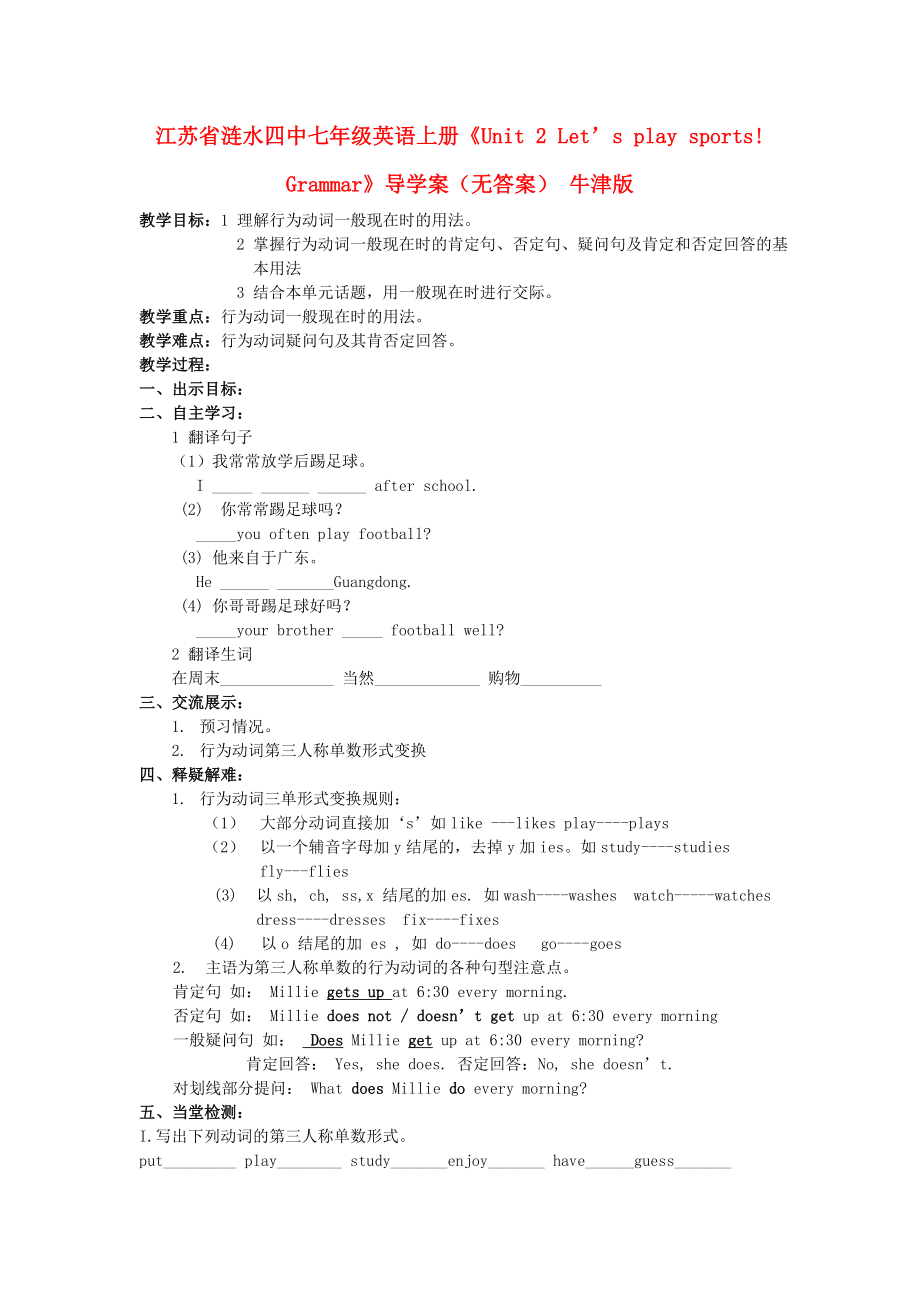《江蘇省漣水四中七年級(jí)英語(yǔ)上冊(cè)《Unit 2 Let’s play sports! Grammar》導(dǎo)學(xué)案(無(wú)答案) 牛津版》由會(huì)員分享��,可在線閱讀�,更多相關(guān)《江蘇省漣水四中七年級(jí)英語(yǔ)上冊(cè)《Unit 2 Let’s play sports! Grammar》導(dǎo)學(xué)案(無(wú)答案) 牛津版(2頁(yè)珍藏版)》請(qǐng)?jiān)谘b配圖網(wǎng)上搜索。
1�����、江蘇省漣水四中七年級(jí)英語(yǔ)上冊(cè)《Unit 2 Let’s play sports! Grammar》導(dǎo)學(xué)案(無(wú)答案) 牛津版
教學(xué)目標(biāo):1 理解行為動(dòng)詞一般現(xiàn)在時(shí)的用法���。
2 掌握行為動(dòng)詞一般現(xiàn)在時(shí)的肯定句�����、否定句、疑問(wèn)句及肯定和否定回答的基本用法
3 結(jié)合本單元話題����,用一般現(xiàn)在時(shí)進(jìn)行交際。
教學(xué)重點(diǎn):行為動(dòng)詞一般現(xiàn)在時(shí)的用法。
教學(xué)難點(diǎn):行為動(dòng)詞疑問(wèn)句及其肯否定回答���。
教學(xué)過(guò)程:
一��、出示目標(biāo):
二����、自主學(xué)習(xí):
1 翻譯句子
(1)我常常放學(xué)后踢足球���。
I _____ ______ ______ after schoo
2���、l.
(2) 你常常踢足球嗎?
_____you often play football?
(3) 他來(lái)自于廣東�����。
He ______ _______Guangdong.
(4) 你哥哥踢足球好嗎�����?
_____your brother _____ football well?
2 翻譯生詞
在周末______________ 當(dāng)然_____________ 購(gòu)物__________
三���、交流展示:
1. 預(yù)習(xí)情況����。
2. 行為動(dòng)詞第三人稱(chēng)單數(shù)形式變換
四、釋疑解難:
1. 行為動(dòng)詞三單形式變換規(guī)則:
(1) 大部分動(dòng)詞直接加‘s’如like
3���、 ---likes play----plays
(2) 以一個(gè)輔音字母加y結(jié)尾的�,去掉y加ies����。如study----studies
fly---flies
(3) 以sh, ch, ss,x 結(jié)尾的加es. 如wash----washes watch-----watches
dress----dresses fix----fixes
(4) 以o 結(jié)尾的加 es , 如 do----does go----goes
2. 主語(yǔ)為第三人稱(chēng)單數(shù)的行為動(dòng)詞的各種句型注意點(diǎn)。
肯定句 如: Millie gets up at 6:30 every morn
4���、ing.
否定句 如: Millie does not / doesn’t get up at 6:30 every morning
一般疑問(wèn)句 如: Does Millie get up at 6:30 every morning?
肯定回答: Yes, she does. 否定回答:No, she doesn’t.
對(duì)劃線部分提問(wèn): What does Millie do every morning?
五�����、當(dāng)堂檢測(cè):
I.寫(xiě)出下列動(dòng)詞的第三人稱(chēng)單數(shù)形式���。
put_________ play________ study_______enjoy___
5、____ have______guess_______
dress_______ miss_____ watch________fly_________do_______ go________ wash_____
teach______ fix_______
II.單項(xiàng)選擇
( )1. ---_______? ---Yes, he does.
A. Do you like apples B. Does he like apples
C. What does he like D. Does she like apples
( )2. My sister
6���、 likes watching TV, but my brother______ like it.
A. is B. isn’t C. don’t D. doesn’t
( )3.My little sister glasses after school.
A. does not B. does wear C. doesn’t wear D. not wear
( )4.My cousin Bobby enjoy
A. play games B .listen to the radio C. wear glass
7、es D .playing basketball
( )5._______your sister_____to school every day?
A . Are walk B Is walk C. Does walks D. Does walk
III.句型轉(zhuǎn)換����。
1. I play football very well.(改一般疑問(wèn)句并否定回答)
______ you _____football very well?
_____ ,______ ______.
2. He does his homework every da
8�、y.( 改否定句)
He _______ ______his homework every day.
3. She goes to school by bike every day(改一般疑問(wèn)句并肯定回答)
________she_____to school by bike every day?
______, _____ _____.
4. I do my homework on Sundays(改一般疑問(wèn)句)
_____you_____your homework on Sundays?
IV.用所給動(dòng)詞的適當(dāng)形式填空���。
1. She __
9�����、_____( have) breakfast at home every morning.
2. _______your father_______(teach) English?
3. Miss Green _____( teach ) us Chinese.
4. Tom often _______(go) to school by bike.
5. Sometimes, my brother_______( fly) a kite in the playground.
V. 用括號(hào)內(nèi)所給動(dòng)詞的正確形式填空:
Dear Simon,
At the weekend,
10���、 I get up early. I _________ (go) swimming for half an hour. Then I _________(come) back home for breakfast. My mother _________(do) the housework, and she _________(be) always busy. My father _________(not do) housework. He _________(work) very hard on weekdays, so now he needs rest. In the morning I _________(do) my homework. In the afternoon, my father and I _________(go) swimming. My father _________(love) swimming, and he is good at it. My mother _________(enjoy) reading. In the evening, we often _________(eat) in a restaurant.
_________(write) to me soon!
六、自我評(píng)價(jià):
 江蘇省漣水四中七年級(jí)英語(yǔ)上冊(cè)《Unit 2 Let’s play sports! Grammar》導(dǎo)學(xué)案(無(wú)答案) 牛津版
江蘇省漣水四中七年級(jí)英語(yǔ)上冊(cè)《Unit 2 Let’s play sports! Grammar》導(dǎo)學(xué)案(無(wú)答案) 牛津版

